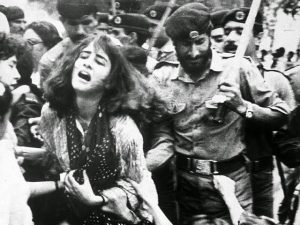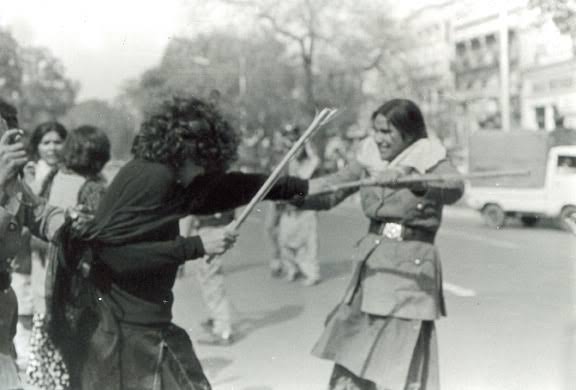Pakistan: a Conservative Society
Long before Zia’s rule, Pakistan has remained a conservative nation. The kind that continually resists debate and rejects any notion of embracing change, especially that which may benefit its women. Change, however, tends to be inevitable, no matter how much external factors may try to slow its pace.
The Hudood Ordinances and a Historic Pushback
Zia’s introduction of the Hudood Ordinances in 1979 brought Pakistani women to their breaking point. Having known the society to be suffocating for themselves for as long as they’d lived, the implementation of these draconian laws pushed Khawateen-e-Pakistan to the precipice. The glaringly clear question presented itself: if not now, when?
The feminist movement gained momentum in the country, and women from all factions of society came out on the streets against the atrocious misogyny that had now been codified in the Pakistani legal system. From discriminating against non-Muslim women when it came to witness evidence for rape and assault cases to the lack of recognition for marital rape, the picture that was being painted for the future of their homeland was absolutely unacceptable for the women of Pakistan. The state cracked down on the protestors, violating the long-held concept of honoring the chaadar and chaar-diwari. It has been proven multiple times since then that dignity, in this country, is reserved only for the ‘well-mannered’ women. Though it wasn’t until 2006 that the hudood ordinances were reformed, allowing rape to be prosecutable under civil law, the public demonstrations of the 1980s laid the foundation of courage that the feminist movements in Pakistan have since been building upon; the women had spoken.
The Need for Equality of Opportunity and the Dilemma of Consent
Fast forward to the present: while the feminist movement continually strives towards gender equality and breaking down our long-standing patriarchal norms, the society is constantly faced with dilemmas.
One such dilemma is regarding the concept of consent and its understanding in the masses.
The flawed perception of consent in Pakistani society can be clearly sensed through the tiresome and perpetual victim-blaming culture prevalent to this day. With every rape case comes a horrific amount of victim blaming. Misogyny has nobounds: men, women, old, young, poor, and rich, as if the whole nation unifies into questioning the existence of the victim, almost always when the victim is a woman.
From the inspection of her attire to condemning her need to step out of the house, the concept of consent is completely dismissed. Where the rest of the world is progressing towards equality of opportunity, the Pakistani society is set on closing the world off to women. Be it the lack of mobility due to the horrible safety conditions of the public transport system or the ever-reducing number of women-only safe spaces, the Pakistani woman is continuously pushed back into the house.
Therefore, one wonders: Where does this mindset stem from?
Pakistan is a patriarchal society; this means that the social status of a man is inherently higher than that of a woman, since the day of his birth. While the men are taught how to assert authority, the women are taught submissiveness. Them being the ‘providers’ and the ‘breadwinners’ is reason enough to worship them. The society ensures that this power imbalance stays intact by blocking women’s access to the workplace.
Thus, in many cases, this power imbalance leads to women having little to no say in matters relating to their own selves, reflected in issues such as honor killings and forced marriages.

The Legal System’s Role in Oppression:
Another crucial reason for the perseverance of such illogical thinking is the legal framework surrounding rape. An alarming aspect is that Pakistan does not have a legal age for consent. One could, perhaps, argue that instead of a legal age of consent, Pakistan has laws surrounding the illegality of sexual activity outside of marriage and the Child Marriage Restraint Act of 1929 to control child marriages.
However, these laws, partly outdated (only a fine of Rs. 50,000, that too if implemented), can only do so much to control such grave criminal offenses as rape.
Struggling to protect and define rape, Pakistan’s legal system still fails to criminalize marital rape, resulting in consent in marriages being completely overlooked. The same societal and cultural power imbalance in a marriage aids the instigation of fear, which renders the concept of consent useless. Similarly, as long as such stark power disparity exists in the society, the concept of consent is bound to get disregarded.
The concept of consent in Pakistan is interwoven with levels of cultural, legal, religious, and gender-based issues, making it increasingly difficult for marginalized communities and victims to understand and exercise their right over their own bodies.













